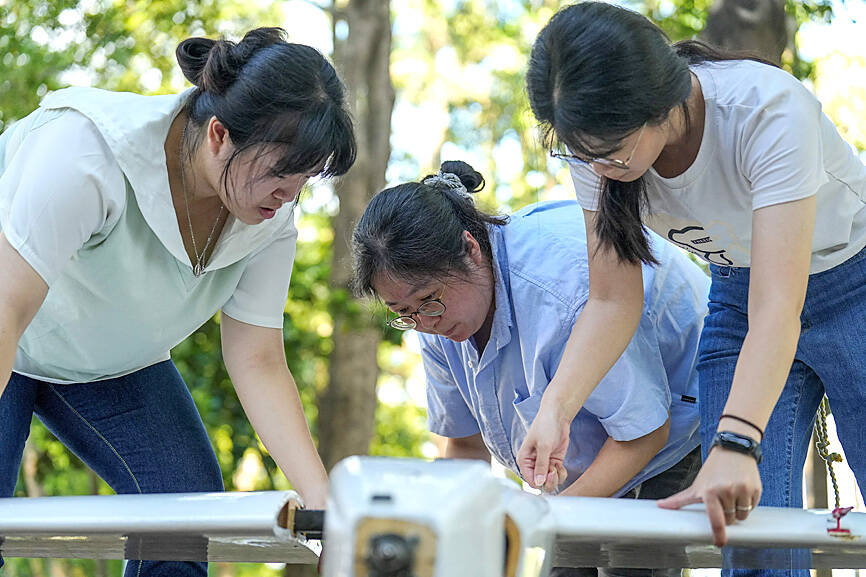At a drone testing field in southwestern Taiwan, university students watched anxiously as uncrewed aerial vehicles (UAVs) they designed took off, landed and, occasionally, crashed in a simulated battlefield scenario.
They are participating in a competition that is helping the nation’s efforts to boost domestic drone production.
With Beijing sustaining military pressure on Taiwan, Taipei is ramping up investment in UAVs, as it seeks to bolster a more agile defense against a potential Chinese attack.

Photo: Walid Berrazeg, AFP
Ukraine and Russia have used UAVs extensively throughout their conflict, for surveillance and striking targets deep behind front lines.
The UAVs flying in the National Defense Application UAV Challenge could potentially be adopted by drone companies and procured by the government.
“We can see drone applications in many current conflicts happening around the world,” said competition organizer Jan Shau-shiun (詹劭勳), a professor in the space systems engineering department at National Cheng Kung University.
“Taiwan is in a position where we might also face such an issue, so based on this theme, we aim to strengthen our drone capabilities,” he said.
Now in its second year, the competition was held over two days last month at the Asia UAV AI Innovation Application R&D Center in Chiayi County.
Twenty teams from across the nation gathered to put their drones to the test. The field would be whittled down to a shortlist this month for another challenge before the winner is declared next year.
Multirotor and fixed-wing drones were required to fly autonomously to a height of at least 60m, take images of a remote target and return to base within 10 minutes. To make the scenario more realistic — and difficult — organizers this year used a jammer to disrupt satellite signals to the UAVs, making it harder for them to stay airborne.
“From observing the war in Ukraine and other conflicts, we can see that there’s often interference on the GNSS [Global Navigation Satellite System] before any fighting,” Jan said.
After spending countless hours designing and building their drones, with help from local drone or electronic component companies, teams watched nervously as their UAVs took flight. Some drones failed to reach the required height or crashed due to the jamming.
Cheng Yong-jen, 24, breathed a sigh of relief after the drone he helped design ascended, soared into the distance and safely returned.
“It crashed, we repaired, it crashed again and we repaired again,” said Cheng, a graduate student from National Formosa University. “When the drone finally descended, I was in tears.”
Lin Chun-liang (林俊良), lead judge and professor of electrical engineering at National Chung Hsing University, said the competition helped students develop “hands-on skills” not taught in schools.
The government is spending hundreds of millions of dollars to buy and develop drones, and also nurture local talent to work in the sector, as it races to upgrade its military capabilities.
President William Lai (賴清德) has pledged to make Taiwan “the Asian hub of unmanned aerial vehicle supply chains.”
However, keeping workers in the industry is a challenge in a country where the huge semiconductor sector can offer higher salaries to top graduates.
Cheng said he planned to join a drone company after finishing his master’s thesis on defense UAVs, adding that “this is the path we must take.”
“We cannot stop moving forward just because we are behind others,” Cheng said.

Alain Robert, known as the "French Spider-Man," praised Alex Honnold as exceptionally well-prepared after the US climber completed a free solo ascent of Taipei 101 yesterday. Robert said Honnold's ascent of the 508m-tall skyscraper in just more than one-and-a-half hours without using safety ropes or equipment was a remarkable achievement. "This is my life," he said in an interview conducted in French, adding that he liked the feeling of being "on the edge of danger." The 63-year-old Frenchman climbed Taipei 101 using ropes in December 2004, taking about four hours to reach the top. On a one-to-10 scale of difficulty, Robert said Taipei 101

Nipah virus infection is to be officially listed as a category 5 notifiable infectious disease in Taiwan in March, while clinical treatment guidelines are being formulated, the Centers for Disease Control (CDC) said yesterday. With Nipah infections being reported in other countries and considering its relatively high fatality rate, the centers on Jan. 16 announced that it would be listed as a notifiable infectious disease to bolster the nation’s systematic early warning system and increase public awareness, the CDC said. Bangladesh reported four fatal cases last year in separate districts, with three linked to raw date palm sap consumption, CDC Epidemic Intelligence

Two Taiwanese prosecutors were questioned by Chinese security personnel at their hotel during a trip to China’s Henan Province this month, the Mainland Affairs Council (MAC) said yesterday. The officers had personal information on the prosecutors, including “when they were assigned to their posts, their work locations and job titles,” MAC Deputy Minister and spokesman Liang Wen-chieh (梁文傑) said. On top of asking about their agencies and positions, the officers also questioned the prosecutors about the Cross-Strait Joint Crime-Fighting and Judicial Mutual Assistance Agreement, a pact that serves as the framework for Taiwan-China cooperation on combating crime and providing judicial assistance, Liang

US climber Alex Honnold left Taiwan this morning a day after completing a free-solo ascent of Taipei 101, a feat that drew cheers from onlookers and gained widespread international attention. Honnold yesterday scaled the 101-story skyscraper without a rope or safety harness. The climb — the highest urban free-solo ascent ever attempted — took just more than 90 minutes and was streamed live on Netflix. It was covered by major international news outlets including CNN, the New York Times, the Guardian and the Wall Street Journal. As Honnold prepared to leave Taiwan today, he attracted a crowd when he and his wife, Sanni,